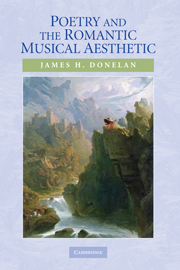Book contents
- Frontmatter
- Contents
- List of Musical Examples
- Acknowledgments
- Preface: The Sound and the Spirit
- Chapter 1 Self-Consciousness and Music in the Late Enlightenment
- Chapter 2 Hölderlin's Deutscher Gesang and the Music of Poetic Self-Consciousness
- Chapter 3 Hegel's Aesthetic Theory: Self-Consciousness and Musical Material
- Chapter 4 Nature, Music, and the Imagination in Wordsworth's Poetry
- Chapter 5 Beethoven and Musical Self-Consciousness
- Chapter 6 The Persistence of Sound
- Notes
- Bibliography
- Index
Chapter 1 - Self-Consciousness and Music in the Late Enlightenment
Published online by Cambridge University Press: 22 September 2009
- Frontmatter
- Contents
- List of Musical Examples
- Acknowledgments
- Preface: The Sound and the Spirit
- Chapter 1 Self-Consciousness and Music in the Late Enlightenment
- Chapter 2 Hölderlin's Deutscher Gesang and the Music of Poetic Self-Consciousness
- Chapter 3 Hegel's Aesthetic Theory: Self-Consciousness and Musical Material
- Chapter 4 Nature, Music, and the Imagination in Wordsworth's Poetry
- Chapter 5 Beethoven and Musical Self-Consciousness
- Chapter 6 The Persistence of Sound
- Notes
- Bibliography
- Index
Summary
How can I say I! without self-consciousness?
– Friedrich Hölderlin, “Judgment and Being”No other philosophical concept so clearly defines the end of the Enlightenment and the beginning of Romanticism as self-consciousness, the process by which the self becomes aware of its status as a thinking, knowing entity, and the precondition, according to the Idealists and Romantics, for all knowledge. In a limited sense, the concept goes much farther back into the history of philosophy, to Plato or even Parmenides, and one could even make a case for the presence of poetic or musical self-consciousness in the Homeric epics. However, by the seventeenth century, Descartes appeared to have made the definitive statement about self-consciousness with the cogito, the well-known “I think therefore I am” argument of the Meditations on First Philosophy. Enlightenment philosophical investigations after Descartes generally turned outward, toward the systematic acquisition and organization of all possible knowledge about the world, following Newton's and Leibniz's mathematical models of understanding, the alphabetical tendencies of Voltaire, Diderot, and the Philosophes, or the British empiricists’ distrust of metaphysics. Immanuel Kant, at the time an obscure professor at the University of Königsberg, returned to the problem with the Critique of Pure Reason in 1781 by focusing his considerable analytic power on knowledge itself and separating it into two central categories: a priori knowledge, that which is known prior to experience, and a posteriori knowledge, that which is known as a result of experience.
- Type
- Chapter
- Information
- Poetry and the Romantic Musical Aesthetic , pp. 1 - 32Publisher: Cambridge University PressPrint publication year: 2008



